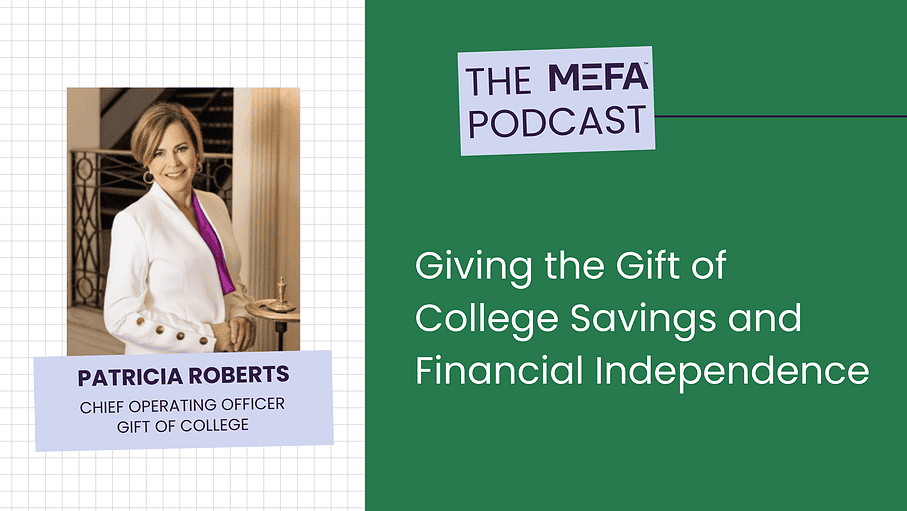Resources Mentioned in this Episode
Please note that this transcript was auto-generated. We apologize for any minor errors in spelling or grammar.
Please note that this transcript was auto-generated. We apologize for any minor errors in spelling or grammar.
Patricia Roberts: [00:00:00] Now to the gifting point, was gifting available back in 1999 or were these tools available while I was saving? No, not in the early years. It was probably until 2010 or so that these gifting tools started to surface, and when they did, I began to. Slowly gingerly, ask friends and family to really forego those more traditional gifts and instead contribute toward Ben’s account.
So I did have the opportunity to try some of the tools out and to utilize them, but they were nowhere near available as they are today. So I’m excited to really. Be an individual who gives the gift of college through the types of gift cards that MEFA is offering. I give them all the time, every baby shower, every birthday party, every December [00:01:00] holiday, I’m on it.
And that’s what I give because I feel it’s probably the best thing that a family can receive.
Jonathan Hughes: Hi everyone, and welcome to the MEFA podcast. My name is Jonathan Hughes and we’re bringing you this episode on the eve of the holiday season. And like we do every holiday season, we want to remind you that savings for the future makes a great gift. Whether that means a gift to a college savings account for a child, or money for an able account for a loved one with a disability.
Financial independence and security is a great gift. And you just heard our guest on the show today talking about that. She’s Gift of College Chief Operating Officer Patricia Roberts, and I’m really excited to finally have her on this show and you’ll see why when you hear our conversation. She is uniquely positioned to talk about all of these things because she’s really lived all of these things, not just in her professional life, but personally too.
Now, MEFA [00:02:00] partners with Gift of College to offer MEFA gift cards and both physical and now digital varieties, and we’ll talk about that. Of course. We’ll also talk about Patricia’s personal story, including her work with Gift of College. Her history with ABLE accounts and her advocacy for college savings, including the book she wrote on the topic.
And my favorite touch, of course, the value of a philosophy degree. So I’ll be back after the interview. To wrap things up, now, let’s meet our guest.
Patricia Roberts: I’m Patricia Roberts, chief Operating Officer at Gift of College, where we make it very easy for individuals and employers to invest in the futures of those they care about beyond my extensive professional experience with 529 Plans over 25 years. I have a close personal connection to the topic of saving for college and disability expenses, and in my favorite role of all. [00:03:00] I am the mom of a Clark University graduate, not too far from you in Worcester, Massachusetts.
Jonathan Hughes: Can you just let everybody know how MEFA and Gift of College work together and what we do and what’s new that we have to offer?
Patricia Roberts: Absolutely. I’d love to just tell you a bit about Gift of College, a bit more about it because it’ll more sense when I describe the exciting news about Gift of College and MEFA Gift of College through a platform, an innovative platform enables friends. Family, employers and others to contribute with ease to 529 college savings accounts, able disability savings accounts, and student loan accounts of individuals they care about.
And how is this accomplished? By two ways. One gift cards, which we’re going to talk about with respect to MEFA. Individuals can buy [00:04:00] gift cards and give them for birthdays, holidays, and other occasions. And individuals who’ve received those gift cards can contribute them to their 529 college savings or disability savings account.
And then the other way this is accomplished is through an employer platform that we have. Whereby employers can offer payroll deduction to 529 college savings or able disability savings, and match those contributions as well. So we’ve got a twofold way to help individuals not have to go it alone.
Because others can contribute. So what’s happening between MEFA and Gift of college is very exciting. So more than a year ago, we began working together by expanding MEFA’s reach with its excellent 529 plans, and its able plan by getting its brand, the MEFA brand on Gift of College gift cards.
Throughout [00:05:00] Massachusetts in CVS stores, that was the first thing we began doing together. So these gift cards can be found at various CVS stores in Massachusetts, and they can be purchased by gift givers as an easy gift to give and given to those they care about and redeemed into one of MEFA’s 529 plans or it’s Able plan Attainable. So that’s the first thing we did together.
Jonathan Hughes: And you have a copy of one of those cards, right?
Patricia Roberts: I do. Let me show you. When I was last in Boston and saw you, Jonathan, I went into a stop and shop, which is going to be part of our additional news and found this gift card. So it’s a gift of college gift card co-brand it. MEFA UFund, MEFA UPlan, MEFA Attainable and it was available in denominations of $25 to $500. So this is the first way we start it and we start it with CVS [00:06:00] now. As I just mentioned, we are in additional retailers together. So in Massachusetts not only CVS, now, not only many CVS stores, but also Stop and Shop and Cumberland Farms.
So these gift cards can be found at a number of retailers in Massachusetts. And we’re very excited about that. So that’s part one, the expanded retail footprint, getting your wonderful brand out to consumers throughout your state in this way. The other exciting news is an online shopping card on mefa.org and Jonathan, I’m sure you can make the link available in the show notes.
Jonathan Hughes: Certainly will.
Patricia Roberts: Okay. Do that. But through that. Individuals can buy. Digital gift cards or e-gift cards for this very same purpose. So some may prefer to go shopping and have something tangible [00:07:00] to give. Others may prefer to simply go online and select an e-gift card, a MEFA e-gift card to give to individuals they care about for special occasions coming up.
So that is a very new development. The images that are available on these digital gift cards are absolutely adorable. They are suitable for all sorts of celebrations. And there is one in particular that is very fitting for a recipient who has an ABLE account as well. So that’s what’s happening with MEFA and Gift of College, and we couldn’t be more excited about it.
Jonathan Hughes: That’s great. And since you mentioned ABLE accounts a couple of times, can you just talk about what an Able account is and how this could be used?
Patricia Roberts: Sure. So much like a 529 college savings account. An ABLE account is a tax advantaged way to save for a particular purpose. While the 529 accounts [00:08:00] particular purpose is education and primarily higher education, although it can now be used for K to 12, in certain instances, the ABLE Accounts primary purpose is to pay and save and pay for disability related expenses.
So those expenses can be extremely broad for an individual who has a significant disability, which began. Before age 26 currently, but as of the first of the year, it’s for anyone with a significant disability subject to certain conditions that began before age 46. So how do these accounts work? So individuals who qualify for them and it’s really self substantiating.
It’s significant disabilities, those are, that are not likely to be easily overcome. Those that interfere with. Activities of daily living, individuals who receive SSI or other forms of assistance are [00:09:00] eligible, and certainly medical certification could be received by individuals for their own documentation in order to be deemed.
Qualified to participate in an ABLE plan, but what those individuals can do is at last, have money in their own name that is not at risk of interfering with other benefits they receive. Jonathan, you may know I have a brother with a developmental disability. His disability began well before age 26 actually at birth, and for years he could never have money in his own name because if he had more than $2,000, he was at risk of having his Medicaid and some other benefits.
Potentially reduced that now has ended with the introduction of these able plan accounts nearly 11 years ago. So now individuals can save up to, I believe, a hundred thousand dollars in an account that they [00:10:00] own and not fear the loss of these other benefits. So that’s tremendously valuable. And what can.
For with these accounts, really almost anything that enhances their health and wellbeing. Certainly that could be education if they were so inclined to pursue some form of education. But it could also be assistive technology automobile housing. Food home care services, professional services of other types, really anything that they need to keep the quality of life enjoyable for them and to keep them healthy.
So I’m really excited about these ABLE accounts. Not enough people know about them. The fact that these gift cards that you now have co-branded and expanded in Massachusetts can be used for them. I think we’re going to get more participation and more support for those with disabilities, and I couldn’t be happier about this.
Jonathan Hughes: Yeah. I certainly hope you’re right. Thank you’re right as well. And I wanna thank you for talking about your own [00:11:00] personal experience and I wonder if you could, talk about, you mentioned before being a mom of a Clark. University graduate. What was your experience, your personal experience in saving for college?
And, I don’t know if this was if gifting was an option at this point, or, what personal experience do you have with either gifting platforms for 5 29 or attainable. Or able, excuse me.
Patricia Roberts: Okay. A lot there. Let’s see. In terms of my personal experience of saving for college, that actually goes back to my own childhood experience of almost missing the opportunity to go to college.
These childhood experiences really fueled the reason why I saved for my son. Why I am so determined to help other families. So as a student in a low income family, headed by a single mom and touched by the disability of my brother, I almost missed the opportunity to go to college. In fact, my guidance counselor suggested I stick with [00:12:00] that junior high school waitressing job, which I continued through high school instead of pursuing higher education, my mom would have nothing of it, and I did go to college and worked multiple jobs.
Sent money home and attained not one but two degrees. But at a cost. So I wound up having to repay tens of thousands of dollars in student loan debt. No regrets for pursuing that higher education. It enabled me to lift myself and my mom out of tough circumstances, but I did have to repay that cost and the repayment of that student loan debt and the attainment of my own education.
Really fueled my desire to do better for my son. So when he arrived in my life in 1999 and I was paying back together with his dad over a hundred thousand dollars in our collective student loan debt, we made a decision to start saving in a 529 plan a little at a time from our paychecks, and I’m happy to report, which you may or [00:13:00] may not know, Ben did graduate.
With two debt-free degrees from Clark University, and I couldn’t be happier about it. Yes. Now, to the gifting point, was gifting available back in 1999 or were these tools available while I was saving? No, not in the early years. It was probably until 2010 or so that these gifting tools started to surface, and when they did, I began to slowly.
Gingerly ask friends and family to really forego those more traditional gifts and instead contribute toward Ben’s account. So I did have the opportunity in those years of later middle school, through college, to invite friends and family to do those small amounts that were given even by my mom who was on a fixed income, $25 here and there.
Really in time grew in value to perhaps pay for some of Ben’s books while he was at Clark University. So I did have the opportunity to try some of the tools out and [00:14:00] to utilize them, but they were nowhere near available as they are today. So I’m excited to really. Be an individual who gives the gift of college through the types of gift cards that MEFA is offering.
I give them all the time, every baby shower, every birthday party, every December holiday, I’m on it. And that’s what I give because I feel it’s probably the best thing that a family can receive.
Jonathan Hughes: So you know, you’ve spoken very eloquently, of course, about. Your own story and how the college education that you have has, as you said raised you up and raised up members of your family as well.
And you wrote about that in your book. And I want to talk a little bit about your book and when you wrote that and why you decided to write it and what you want people to get from it.
Patricia Roberts: Sure, and thank you for asking about it, and thank you for reading it. So my book called Route 529. Here it is, A Parents’ Guide to Saving for College and Career Training.
I want to stress that with 529 plans. Why did I write this book and [00:15:00] when. I found myself during a period of social distancing. You’ll remember it in 2020 with some extra time on my hands, and I wasn’t inclined to start baking sourdough bread or doing some of the other activities that people were succeeding so greatly at.
I really thought I had seen just yet another survey that talked about the lack of awareness of 529 plans, and I was hearing on the news the struggle that individuals were having in repaying student loan debt during the pandemic, and I thought, you know what? I’ve got so much experience on this very topic.
I’ve got time on my hands. I’ve got a student that’s about to enter his senior year and graduate debt free. Why don’t I use this time, if not now, when to educate other parents in very easy to understand terms about what these five to nine plans are and to inspire them to take. [00:16:00] Small, consistent steps to save toward whatever future plans their child may have.
And in doing so, I informed families about the ability that others could contribute to these accounts. I busted some of the most common myths about 529 plans, and I wove into the book. It’s really a book about the journey of savings, thus that road work on the cover. I worked into it a bit about my own personal journey and the journey of others with their permission, who I know well, how they went about saving no one’s journey is the same, but I believe the information I offered.
Is easy to access, easy to understand, and I believe it’s making a difference. At the end of every chapter, I do key takeaways. I’m envisioning a busy working mom or dad reading the book, setting it down, maybe running after a toddler. I made it easy to, for people [00:17:00] to remember exactly what the key points are in the book with lots of visuals.
You’ll remember that there were lots of visuals and a really touching. Forward, written by my son Ben, about his experience of growing up in a family, prioritizing the savings, driving a 25-year-old car, which literally got him to and through college. We never bought another car during his childhood. To this day, we still have it.
He reflects on the sacrifices we made. To have him be able to pursue a degree of his choice and to graduate without that crushing weight of debt.
Jonathan Hughes: That in and of itself is impressive that, you, your son really does feel the value and the weight of everything that he has from his education and what you gave up or how you finance his education as well.
Patricia Roberts: Yeah, it’s true. And he was able to do things like. First of all, pick a school that felt appropriate for him. We were very candid about the amount of [00:18:00] money we had saved. He knew about it along the way. We started in age appropriate ways, talking about it. When it came time to tour colleges and to consider options, he knew how much we had saved.
So he had a good understanding of what his circumstances would look like after college. If he went to a school that we couldn’t quite afford, he knew he would be borrowing or perhaps serving as a resident advisor or working multiple jobs. But he picked the school gladly that was the best fit for him and it was a good financial fit for our family as well.
But he was able to pursue unpaid internships while he was in school because he didn’t have to worry so much about summer money contributing towards fall courses. He was able to volunteer on campus and off campus in his community there in Worcester. He was also able to study abroad and study something that interested him most.
Those were the options that planning [00:19:00] ahead provided him, and I’m so glad that he reflected on it and shared that in my book. I think he was the perfect person to write the forward.
Jonathan Hughes: Yeah. And congratulations on that once again. And you’re very. Eloquent and effective advocate for saving for college and for higher education in general I want to ask you how you entered this field.
Patricia Roberts: Sure. So I mentioned to you that I obtained both an undergraduate degree and a number of years later, six or seven years later, I pursued a law degree at night while working full time, and it was while I was an attorney at Citigroup. As an investment management attorney or investment advisory attorney that the topic of 529 landed on my desk.
They needed an attorney to focus on this potential line of business for Citigroup as they desired to get into it, to help families [00:20:00] invest those funds. For college and I happened to be expecting my son at the time. I happened to be repaying over a hundred thousand dollars in student loan debt with my husband, and I couldn’t imagine a better assignment landing on my desk.
So that’s how I first got into. 529 plans. That was 1998. Or maybe a little bit before then, but my expertise began to develop then, and it’s been so rewarding to work not only as an attorney, but then on the business side at Merrill Lynch and Alliance Bernstein Investments to help form a really.
Impactful philanthropic platform here in New York City called New York City Kids Rise through which over 250,000 public school students now have seed money for college, and then to move on to gift of college and to help in this way. I really feel like I’ve gone full [00:21:00] circle as someone, challenged to pursue higher education, challenged to pay back my own debt.
Able to save for my son and see him graduate debt free and now able to help so many others do just that. So I couldn’t be more satisfied with my career and the route not to lead back to the book that it. It has taken.
Jonathan Hughes: You mentioned New York City Kids Rise, and I know you worked as well with the Rhode Island CSA program and in a way, Yeah you’re right.
It comes full circle. These things all bleed together and that is CSA programs, in case anybody is listening doesn’t know what those are. I wonder if you could just talk about what they are.
Patricia Roberts: Yeah. So these are programs designed in different ways by either states. Or communities, I guess municipalities, sometimes nonprofits, but these are programs through which young people, sometimes at birth as in the state of Maine, [00:22:00] and you’ve got something there in Massachusetts as well.
California has something whereby at birth or in the case of New York City’s program. At kindergarten families are given seed money for college savings accounts. So they’re given a little something to get them started and even better to acquaint them with the topic of college savings and five to nine plans.
So it’s not just handing money to a family to get them. Interested in saving for college, but it’s giving them as well the financial education they need to begin to add or open their own account and add funds to it as well. So these programs have been around for a number of years. I think Maine told us at that recent event we’re at together, Jonathan, that there.
Youngest recipients are now in high school about to [00:23:00] graduate. I know California has some graduates as well, but it’s being studied what impact these accounts are having, and it does seem that even modest amounts of initial savings that families do add to can really make a difference in a child’s outlook about their future and their success.
In pursuing and attaining some form of higher education, so I’m really happy to have been involved. I launched the Rhode Island program on July 1st, 2010. It was called College Bound Baby. Then in 2017-18 helped design and launch this New York City Kids Rise program, which has been so successful, really very satisfying, and a great way to acquaint individuals who may never have heard about a 529 plan, may never have aspired or thought their child could aspire to college, to get them thinking along different lines and [00:24:00] planning a little at a time for their child’s future.
Jonathan Hughes: And one thing I love about it too, and it ties in with Gift of College of course, is that this idea has really exploded. That you don’t have to go it alone as a parent. That a child really can benefit from communal sort of activity of having other people save for college for them or college and career for them.
Patricia Roberts: That’s right. You don’t need to go it alone. And I think that. Is one of the most reassuring aspects of the messaging that you are relaying at MEFA by offering all of these many ways to contribute towards someone else’s account. And it’s exactly what I get across in my book. It’s exactly what I speak to people about.
Getting the account open is important. Beginning to fund it in whatever way you can on an automatic basis, preferably. And then getting that circle of support involved is so very important. And I love that your organization is [00:25:00] really getting people aware of the many different ways they can do that.
Jonathan Hughes: And of course, we’re very excited by our partnership with Gift of College helping us to do that very effectively.
So thank you. I want to finish with one question because I know, knowing you, i, and I know you, you mentioned a couple of degrees that you had. One thing that parents always ask about or students always ask about is they’re may be hesitant to, to study a particular major or to choose a major.
They want to know is it worth it as a college degree worth it? If you don’t get a job in the field with which. In the field in which you got a degree. So bearing that in mind, and I always tell them it is, but what was your initial degree in?
Patricia Roberts: Sure. So my initial degree, my undergraduate degree is a bachelor’s of Arts in both philosophy and political science.
Now, those are two degrees where [00:26:00] it’s not necessarily clear exactly what career path you would take, but they’re wonderful degrees to help you develop skills that could be beneficial in many different careers.
Jonathan Hughes: Yeah, I was wondering if you could tell, because people always joke about philosophy majors oh, you’re going to make a lot of money with that philosophy degree.
But having an actual philosophy major here, who has done extraordinarily well, I wonder if you could just tell us a little bit about maybe what you learned in, in, with your philosophy major that would help you in your life or in your career.
Patricia Roberts: Sure certainly with studying philosophy, there’s an incredible amount of reading and thinking and writing and discourse.
Certainly I refined my critical thinking skills and developed really quite a bit of clarity, which helps me to this day communication and persuasion skills. When you’re a philosopher, those come into play and certainly in political [00:27:00] science, ethical judgment. Certainly in philosophy, we think a lot and we hope in political science as well.
We think a lot about. Ways of being in the world and making judgements about who we show up as and what we’re doing. And also I think both of those degrees helped me to really think about making an impact in the world in some sort of meaningful way since both led to a law degree. That’s just the icing on the cake.
I use my legal skills every single day, even though I’m no longer practicing law. I have kept that license active and there’s not a day that goes by that I’m not thinking in a fashion that I learned in law school. And the legal profession as well helps you to, negotiate well with people, find commonality of interest, which is so essential no matter what you’re working on, and reach conclusions that [00:28:00] serve really a broader audience well, and those skills have helped me so much in really every aspect of the work I now do.
I feel like I am a very effective advocate. For these programs that I believe so deeply in these programs that have helped my own family, my son. My brother, right? With the disability account and the gift cards and the gifting tools that you’ve developed, that can help people as well pay down student loan debt.
We didn’t talk as much about that, but those gift cards and your platform can help with that as well. So for those who weren’t able to save in advance or didn’t save quite as much, you could give a gift this holiday season for someone attempting to pay back the debt. So is education worth it? Yes, I think most every form of post-secondary education is worth it.
It does not need to be a college degree. And as you and I both know, 529 plans [00:29:00] have been expanded through the years most recently through the Tax Reconciliation Act in July, 2025 to cover many forms of education now, non-degree credentials, certificates. Continuing education licenses. I think education is always valuable.
I think if you don’t know what you want to do and you’re really uncertain about pursuing it, it may be wise given the cost to take a pause, take a beat perhaps take a little time to think about what that might be. Sometimes students take a gap year. Could also start at a very inexpensive school or with an inexpensive form of study till you get your feet wet and start deciding what it is that interests you most.
Most I feel strongly no family should be pursuing education that they truly can’t afford. Certainly student loans in manageable amounts seem to be okay for families, but if people are getting into incredible [00:30:00] debt to pursue a particular degree that they may or may not lose use in the end, that can be concerning.
So I say “yay” for education of any sort. Be thoughtful as a consumer about what you pursue. And when you pursue it, and then be open to the many possibilities of where that education may take you. It may be an unexpected path that you may not have thought of. It could be an internship during college that leads you in a different direction or that first job that you got just to get a job that ended up sparking some interest in a field you had never thought of.
But education will always be a good investment in my view, but enter it thoughtfully and don’t overspend if you can do so and get others to help you.
Jonathan Hughes: I would agree that you are a very effective advocate for education. And if anybody’s listening and didn’t know that by now, they do.
Before we go, if that [00:31:00] person who just heard you speak so eloquently about this is interested in college gifting for the holidays or for any other occasion, how do they do that?
Patricia Roberts: First of all, if you’re interested in college gifting, thank you. You are brilliant and you’re going to feel good.
There’ll be no buyer’s remorse in terms of giving a gift toward higher education. How do you go about doing it? We talked about a few ways there in Massachusetts and also across the country, but let’s focus on Massachusetts. The MEFA cards, which I showed you early on, are available. At various retailers, we talked about CVS.
We mentioned Stop and Shop where I picked up this one, and there’s also Cumberland Farms. If you’re outside of Massachusetts, there are other places across the country. You can find those on our Find and Store tool on gift of college.com. You can also, as discussed, buy a digital gift card. You’re in a hurry.
You want to grab [00:32:00] something? Digital gift card on mefa.org/giftcard. That’s another possibility as well. But whatever you do, whether you’re handing it to a child, you’re sending it via email, you are making a very good decision. It’s a win for you. It’s a win for that child’s parents or that disabled individual’s family and certainly a win for the recipient for having a brighter, less stressful financial future thanks to you. So go for it.
Jonathan Hughes: Alright, thank you so much Patricia. I really appreciate having you on and everything you had to say was so valuable and I’m just really glad after so long to have you on the show.
Patricia Roberts: Thank you for inviting me. It’s been a pleasure and I hope I’ll be back at some point.
Jonathan Hughes: I’m sure you will. All right, everyone. That was our show. I would like to [00:33:00] thank our guest, Patricia Roberts, for coming on and sharing her time and her story with all of us. I have truly enjoyed this very much. Patricia, I hope to have you back on the show soon. And folks, if you liked what you heard today or what you saw today on the show and you want to hear more from us on planning, saving, and paying for college and career readiness, then follow the show.
And you can do this wherever you find your podcast. And just as important, please remember to leave us a review. This helps us to keep doing what we’re doing and getting this show out to folks like you. I would like to thank our producer, Shaun Connolly. I would like to thank Meredith Clement, Christina Davidson, Lauren Danz, Lisa Rooney and AJ Yee for their assistance in posting the show. And once again, my name is Jonathan Hughes and this has been the MEFA Podcast. Thank you.













